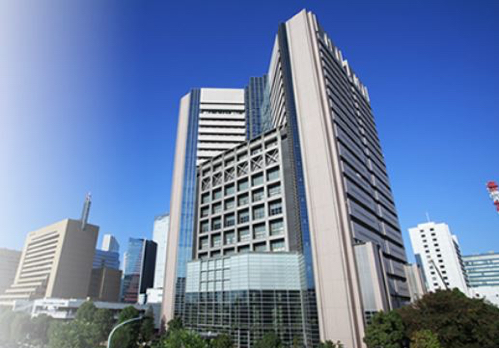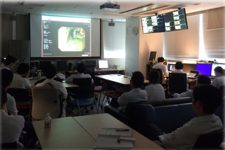National Cancer Center Japan

Established in:1962
Founded as a hub for cancer treatment and research by the central government in 1962, the National Cancer Center has since lead the field. The Center was designated an Incorporated Administrative Agency in April 2010, then subsequently a National Research and Development Agency in April 2015, with a renewed commission to explore and address issues, complementing academia and the private sector. To serve as a nucleus of clinical research and development, the Hospital (Tsukiji campus) and Hospital East (Kashiwa campus) were designated as core hospitals for clinical research respectively in August and September of 2015, since then leading world class clinical research and investigator-initiated trials. It is essential to control cancer with both basic research as well as treatment, and it is our duty to form strategies and present to the nation and to the Japanese people.
Currently, one in every two Japanese citizens will develop cancer in their lifetime. Nearly one million people are newly diagnosed with cancer every year; and as the population is aging, we expect cancer patient numbers to build up. The mission of the National Cancer Center is not only to provide the best possible care including genomic medicine to each individual cancer patient, based on genomic and other clinical and biological information, but also to prevent the onset of cancer by identifying high-risk groups, developing and implementing effective prevention measures. In other words, we are to establish, practice and promote precision medicine tailored to individual patients. To achieve these objectives, it is essential to elucidate traits and diversity of cancer in individuals with integrated omics research including genomic analysis, and to develop optimal individual treatment and prevention methods. Developing an understanding of localized immune response in tumor tissue is also urgently called for.
The following has been our recent focus, in implementing the national Comprehensive 10-year Strategy for Cancer Control, in action from 2014, under the slogan “towards complete recovery from, prevention against, and dealing with cancer”:
Reinforcing research and clinical systems to address unmet medical needs
・Developing a framework to provide optimized treatment and preemptive medical care for individual patients, based on genomic information
Following the revolutionary leap in genome sequencing technology, our nation is building the infrastructure to implement cancer genomic medicine into our national healthcare system. Our hospitals on both Tsukiji and Kashiwa campuses were designated as core hospitals for cancer genomic medicine in March 2018. It is imperative that we work with cancer genomic medicine cooperative hospitals across the nation, to ensure the delivery and quality of the new services, by sharing knowledge and nurturing specialists.
Experts at our two campuses are to integrate our insight and experience to advocate new cancer control strategies and policies. Collaboration with industrial and academic research institutions, to realize effective control over cancer is indispensable. The wishes and hopes of the Japanese citizens, including cancer patients and their families, need to be addressed, towards providing solutions. I, as President, wish to develop and reinforce a system for providing medical care that will allow all cancer patients and their families to keep their hopes alive.
Patient Care
・Clinics and words
Up-to-date diagnosis and treatments are provided, utilizing advanced screening and examination protocols with high-tech systems and equipment.
Approximately 1,300 patients, including new and follow-up patients, visit the hospital daily. More than 130 patients receive chemotherapy in the day care center with 62 out-patient beds. Highly specialized physician groups by cancer types conduct most advanced diagnosis and treatments at National Cancer Center Hospital.
There are 578 inpatients beds in the wards. Each ward is constructed with special attention to patients’ comfort. In the dedicated wards such as clinical trial ward, the transplantation ward and the intensive care unit (ICU), cutting edge treatment and care for chemotherapy and examinations are performed.
Examination/Diagnostic Department
・Most current diagnostic equipments make it possible to provide early detection and diagnosis as well as accurate staging of cancer. The departments are fully equipped with video-endoscopes, magnifying endoscopes, ultrasonographic endoscopes, magnetic resonance imaging (MRI), computed tomography (CT) and positron emission tomography (PET).
Treatment (Surgery, Chemotherapy, Endoscopic treatment and Radiotherapy)
・The best possible treatment for each patient is made available according to the tumor stage and characteristics, using multiple regimens.
Approximately 5,400 operations are performed annually in total 17 operation rooms. Full range surgical intervention to treat cancer from technically demanding surgery to minimally invasive surgery are available. QOL after surgery is the most important outcomes in any cancer treatment. Many patients undergo endoscopic treatment for early lesions of the GI tract, high precision radiation therapy using newest equipments (Cyber Knife, True Beam, etc.). Also highly efficacious intervention radiology therapy with 2 angio-CT systems is available. In many of clinical departments, including surgical departments, clinical trials are actively carried out to develop the state-of-the-art new cancer treatments and to re-evaluate existing standard treatments.
Co-medical support by Nursing Department, Volunteer activities and Pharmaceutical Department
・Patient oriented support is provided in those.
Nurses with specific expertise in cancer care as well as more than 60 volunteer workers together help patients undergo various cancer treatments. They make all possible efforts to reduce the patient’s anxiety, physical and psychological pain. All the patients are respected with integrity and dignity. Nurses and volunteers also support patients to make their independent decisions in various treatment stages. Pharmaceutical Department manages drug dispensing/administration and is responsible for educating patients (both in-patients and out-patients) for overall drug use.
NCC aims for Not to get cancer, not to be defeated by cancer, live with cancer Vision NCC is committed to providing the best possible cancer treatment and care through relentless partnership with the community NCC Logo NCC Logo is designed from the Chinese character meaning cancer gan The outer segment yamaidare meaning disease is removed, and the remains naka is modified (defined in 1970.) The three small circles represent 1. Clinical Service, 2. Research, and 3. Education based on our visions that 1. Provide state-of-the-art cancer treatment and conduct world-class clinical research, 2. Make policies from patients' perspective. The big circle outside symbolizes collaboration from patients and the people (redefined in 2010.) The big circle outside symbolizes collaboration from patients and the people. Missions Discovering the fundamental causes of cancer and realizing its earliest diagnosis and prevention Developing innovation in medical prevention, diagnosis and treatment Establishing and making available the most advanced standard of care to all patients Exploring and providing the best “cancer survivorship” for patients Gathering and disseminating comprehensive cancer related information to the community Talent development of all NCC staff members Recommending new initiatives and policy to the government Contributing to global society in collaboration with international organizations Slogans Novel, Challenge and Change All Activities for Cancer Patients

